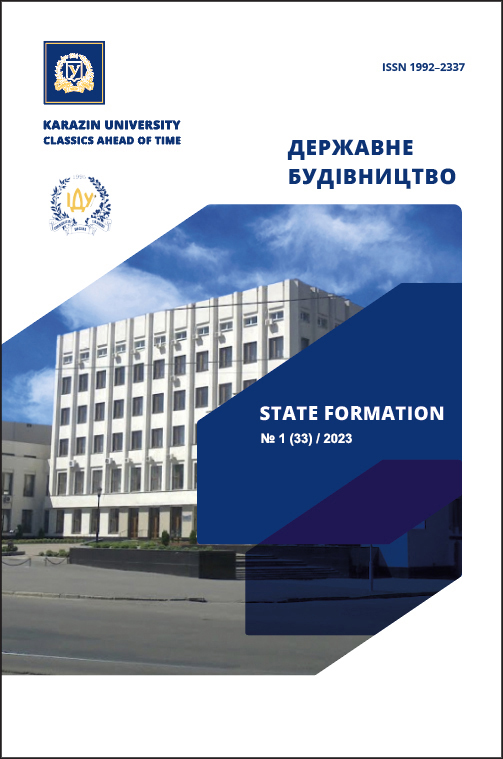WAYS OF TRANSFORMING INSTITUTIONAL MECHANISMS OF PUBLIC ADMINISTRATION IN UKRAINE: FROM INFORMATION THREATS TO HYBRID WARS
Abstract
It was established that in the process of public administration, state bodies face problems that require a special definition and response to them, through the use of unique and effective management tools, such as the "manual management mode". It is in such situations that manual management as precision and anti-crisis management is fully justified. It is substantiated that with the help of the operative application of the manual control method as a non-standard method with the settings of "fine and operative adjustment", the subjects of state administration can achieve the required effect. Under such conditions, it is objectively possible to achieve the set goal in the required time under the changed circumstances. It was found that there are not isolated cases when the domestic system of public administration lacks such approaches, especially in crisis conditions and the information-hybrid war waged against it by the Russian Federation. It is insisted that the proper functioning of the entire institutional system of public administration cannot be ensured all the time in the mode of manual management by the top leadership of the state for obvious reasons. Otherwise, it can lead to the effect of "institutional trap". Manual state management cannot be deep and comprehensive, but only local and temporary, and can even create a separate management system in the general institutional system of public management. It was found that this contradicts the principle of system optimality, because it leads to the disturbance of the optimal state of such a system. Therefore, the manual management mode can be considered as a means of local "adjustment" of the public management system, which is carried out by the managing (coordinating) element in a forced mode to solve existing problems and achieve certain goals depending on the development trend of external and internal system factors. In this context, it is possible to recommend bringing manual management "out of the shadows" by giving it an official status, legislated as the possibility of its application within the framework of a single management system.
Downloads
References
Andriyash V.I. The main components of mechanisms of state regulation of ethnopolitical processes in Ukraine // State management: improvement and development. 2014. No. 4. URL: http://www.dy.nayka.com.ua/?op=1&z=707.
Aristova I.V. State information policy: organizational and legal aspects/ Edited by Dr. Jurid. Sciences, Prof. Bandurky O.M.: Monograph. Kharkiv: University of Internal Affairs Affairs, 2000. 368 p.
Boyko O.A. Threats to the national security of Ukraine in the field of civil protection. URL: http://dspace.onua.edu.ua/bitstream/handle/11300/19294/%D0%91%D0%BE%D0%B9%D0%BA%D0%BE%20%D0%9E%D0 %BA%D1%81%D0%B0%D0%BD%D0%B0%20%D0%90%D0%BD%D0%B0%D1%82%D0%BE%D0%BB%D1%96%D1 %97%D0%B2%D0%BD%D0%B0.pdf?sequence=1&isAllowed=y.
To correct, rather than improve, the manual management of the law enforcement and human rights protection system of the state. URL: https://petition.president.gov.ua/petition/72286.
Dombrovska S.M., Pomaza-Ponomarenko A.L., Lukysha R.T. Institutional state policy of socio-economic development of the regions of Ukraine under risk conditions: monograph. Kharkiv: NUTSZ of Ukraine, 2018. 216 p.
Poroka S.G. Legal support of state policy in the sphere of national and civil security of Ukraine // Bulletin of the National University of Civil Defense of Ukraine. Series: Public administration. 2022. Issue 2(17). P. 316-322.
On optimization of the system of central executive bodies: Decree of the President of Ukraine dated December 9, 2010 No. 1085/2010. URL: https://zakon.rada.gov.ua/laws/show/1085/2010#Text.
On optimization of the system of central executive bodies: Resolution of the Cabinet of Ministers of Ukraine dated September 10, 2014 No. 442. URL: https://zakon.rada.gov.ua/laws/show/442-2014-%D0%BF# Text.
About the Information Security Strategy: Decree of the President of Ukraine dated 12.28.2021 No. 685/2021. URL: https://zakon.rada.gov.ua/laws/show/n0080525-21#Text.
On the Sustainable Development Strategy "Ukraine-2020": Decree of the President of Ukraine dated January 12, 2015 No. 5/2015. URL: https://zakon.rada.gov.ua/laws/show/5/2015.
National Security Strategy of Ukraine: Decree of the President of Ukraine dated September 14, 2020 No. 392/2020. URL: https://www.president.gov.ua/documents/3922020-35037.
Yarovy T.S. Conceptual principles of lobbying as a tool for the implementation of state security goals // Investments: practice and experience. 2020. No. 2. P. 99–103.
Baron S. A Model for Human Control and Monitoring based on Modern Control Theory // Journal of Cybernetics and Information Science. 1976. Vol. 4(1). pp. 3–18.
Hess R.A. Control chapter. In G. Salvendy (Ed.), Handbook of human factors and egonomics. 1997. Wiley (New York). pp. 1249–1294.
Jagacinski R.J., Flach J.M. Control Theory for Humans: Quantitative Approaches to Modeling Performance. 2018. Mahwah (NJ): Lawrence Erlbaum. URL: https://www.researchgate.net/publication/336858814_Control_Theory_for_Humans_Quantitative_Approaches_to_Modeling_Performance.
Mulder M., Van Paassen Marinus M., Flach J. Fundamentals of Manual Control Theory. The Occupational Ergonomics Handbook (second edition) – Fundamentals and Assessment Tools for Occupational Ergonomics, W. S. Marras and W. Karwowski, Eds. CRC Press, Taylor & Francis, London. 2005. pp. 12.1-12.26. URL: https://www.researchgate.net/publication/278677973_Fundamentals_of_Manual_Control_Theory.
Radchenko, O., Кriukov, Kovach, V. ext of “Civilizations Clash” as the Main Object of Infovation War in Ukraine. In: Radchenko, O., Kovach, V., Semenets-Orlova, I., Zaporozhets, A. (eds) National Security Drivers of Ukraine. 2023. Contributions to Political Science. Springer, Cham. https://doi.org/10.1007/978-3-031-33724-6_18. pp. 301-316.

